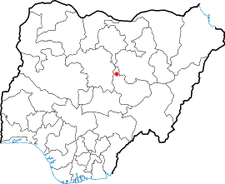2001 Jos riots

The 2001 Jos riots were riots involving Christians and Muslims in Jos, Nigeria over the appointment of a Muslim politician, Alhaji Muktar Mohammed, as local coordinator of the federal poverty alleviation program.[1] The clashes started on 7 September and lasted nearly two weeks, ending on 17 September. Over 1000 people were killed because of the conflicts.[2]
Many houses, mosques and churches were damaged, destroyed or burned to the ground. Torched cars were left along the streets after the clashes between Christians and Muslims. Property and even human beings were set on fire also. Three churches of the Church of Christ in Nigeria (COCIN) were burned. Three major hospitals suggested that their government increased casualty figures by hundreds.[1]
The clashes started on 7 September 2001, when a Christian woman attempted to cross a barricaded street. It led to a conflict between her and a group of Muslims, church leaders said. The fight eventually spread to other parts of the city. Christians were spontaneously attacked by Muslims, according to church leaders. The clash ended on 17 September 2001, when Nigeria's president, Olusegun Obasanjo, lamented the violence between the Muslims and Christians. Local sources see the introduction of military intervention and strictly enforced curfews as the major contributor to the end of the clashes. Because of the large number of people involved who were killed in the clashes, a mass burial had to be arranged as said by Mortuary attendants from Jos University Teaching Hospital and Plateau State Specialist Hospital.[1]
After 10 days of manslaughter, the infamous ethno-religion riots of Jos, the capital of Plateau State in northern Nigeria, recorded to have taken approximately 1000 lives.[3] This riot not only caused the death of countless lives, it also cause the destruction of various infrastructure. Occurring in the early 2000s, with Nigeria being a developing country, the main set of infrastructure that was affected were the kiosks, which were looted and burnt. The burning of churches and Christians also caused this riot to escalate to a level which no one ever expected it to. Similar to the Jasmine revolution that caused the Arab Spring of 2011, this riot was sparked by the oppression by a group of officials on a single person, in this case it was sparked by a Christian trying to cross a barricade set up by a few Muslims.[4] Although this riot was said to have stopped 10 days after, it was just minimised due to the president calling a state of emergency, this riots had outbreaks again in 2008 and in 2010 with each being worse than the previous one. However, 2001 being the first riot cause the displacement of approximately 220,000 civilians whom fled to neighbouring states and cities where there was peace.[5]
This is recorded as the highest number of lives displaced due to the infamous Jos riots, which is because this was the first one and no one knew how to handle the situation as opposed to the latter riots where people were better prepared and safer. This religious conflicts are commonly found on Jos due to its geographical placement in Nigerian. Jos is found in the middle of the country which lies between the predominantly Muslim north and the predominantly Christian south. Jos was also known for its high employment rate and job opportunity which caused it to be a big attraction the immigrants all around Nigeria. These constants riots always have a backlash on the economy of the state, which is one of the various causes of the constant fall of the Nigerian economy. The burning of buildings and high crime rates tend to put a hold on the economy in the state because all offices and business get shut down for the period of the riots and also for the aftermath till the Government feels it is safe for people to leave their houses. Although this has occurred three times in the past 13 years, it has caused the displacement of 250,000 from a population of 3million, which has an effect on the economy.[5]
See also
References
- ↑ 1.0 1.1 1.2 Obed Minchakpu (1 October 2001). "Religious Riots in Nigeria Leave Hundreds Dead". Christianity Today. Retrieved 30 November 2008.
- ↑ "300 bodies taken to mosque on 2nd day of Nigeria riots". CNN. 29 August 2008. Retrieved 30 November 2008.
- ↑ Nigeria Christan and Muslim conflict timeline | Timetoast timelines. Timetoast.com.
- ↑ Religious Riots in Nigeria Leave Hundreds Dead. Christianity Today.
- ↑ 5.0 5.1 A Deadly Cycle: Ethno-Religious Conflict in Jos, Plateau State, Nigeria | ReliefWeb. Reliefweb.int (8 November 2011).
| ||||||